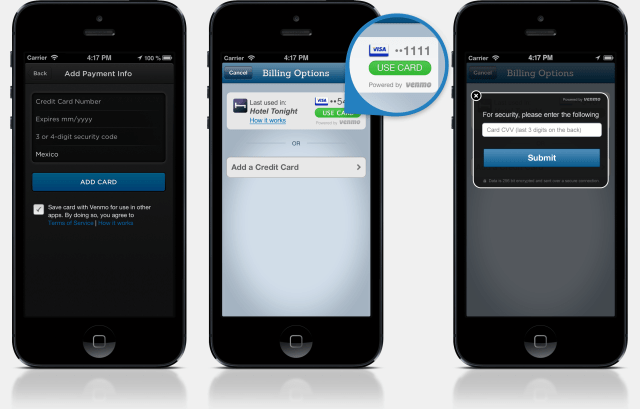Braintree, an Accel and NEA-backed payments company that’s now processing more than $6 billion a year, is launching a new payments layer that lets users sign up to pay for goods and services without having to re-enter their credit card details.
Say you use one app in Braintree’s network — like Airbnb. If you’re a new user to Uber, you won’t have to re-enter your credit card all over again because it may be stored in Braintree’s network.
They’re calling it Venmo Touch, which keeps the brand of the startup Braintree bought in August for $26.2 million. When you sign up for an app in the Venmo network, you’ll have the option of saving your credit card details in it so they can be used in other apps on the platform.
The idea is that by removing one step of friction, more users will go through and complete transactions. The default is checked to opt in users, and Braintree is keeping the initial beta really small with apps like HotelTonight, TaskRabbit and Wrapp.
“There’s tremendous overlap in the customer bases of these apps,” said Braintree CEO Bill Ready. “Putting in your card information into an app is painful and people are doing it 10 to 15 times.”
Braintree recognizes that a credit card might belong to a particular user through device fingerprinting, which collects a number of attributes about a device to create a unique ID. Ready wouldn’t reveal what inputs the company is using to fingerprint devices, but they could include the device model, browser, network and so on. You’d use enough inputs (potentially hundreds) to create enough combinations so that it would be highly improbable to create duplicates.
They also don’t store financial details locally on the phone. “Your data is stored in the cloud,” Ready said. “If we see anything suspicious, we can prompt for the CVV again.”
Braintree has about 35 million uniques on its network and processes more than $6 billion in transactions a year. $1.5 billion of that is on mobile devices. The company’s clients include Uber, Rovio, LivingSocial, Airbnb, Fab.com, GitHub, OpenTable, LevelUp, TaskRabbit and HotelTonight. They charge 2.9 percent plus 30 cents of each transaction.
Ready says the business is profitable even after paying the payment networks and credit card companies their transaction fees. The company has raised at least $69 million in two rounds from Accel Partners, NEA, Greycroft Partners and RRE Ventures. It faces off against a number of competitors including PayPal, which said it finished the fourth quarter of last year with 123 million registered accounts. eBay added in the same earnings release that Paypal was doing $14 billion in mobile volume. Another competitor is Y Combinator-backed Stripe, which is used in many other Y Combinator startups like Hipmunk and Justin.tv.
